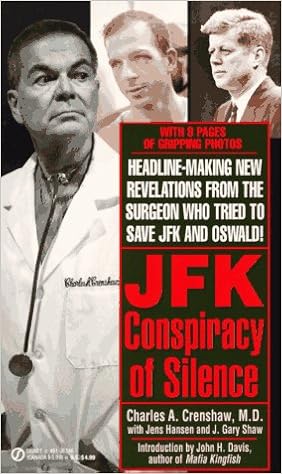| Charles A. Crenshaw, with Jens Hansen & J. Gary Shaw, JFK: A Conspiracy of Silence (Signet, 1992)
Not only was Crenshaw involved in the futile attempts to save Kennedy's life, he was also one of the surgeons who fought to save the life of JFK's accused assassin two days later. In the book, he describes how he was called out of surgery at one point to take a direct call from President Lyndon Johnson, who informed him that he had a representative there -- whom Crenshaw had already encountered inside the surgery room -- who was to take Oswald's confession before or in case he died. Of course, there would not be any such confession because Ruby's bullet had caused far too much damage for Oswald to survive. The Warren Report would basically have you believe that all of the doctors were mistaken about the wounds they observed on the slain president's body -- that they were all basically incompetent. Crenshaw clearly takes offense at such claims. He goes to great pains to dispel any notions that Parkland was just some redneck facility with inexperienced personnel, describing the excellence, knowledge and skills of his colleagues and himself (virtually all of the surgeons who worked on Kennedy would go on to lead distinguished careers as chiefs of surgeries, professors of surgeries and even deans of distinguished medical schools) and details the lengths they went to in trying to save the lives of both Kennedy and Oswald. He also offers important and disturbing insight into the illegal removal of Kennedy's body from Parkland, describing how Roy Kellerman and other members of the Secret Service literally stole the body at gunpoint when Dr. Earl Rose, chief of forensic pathology, tried to stop them. Legally, of course, the autopsy should have taken place there in Dallas. The one drawback to this book is Crenshaw's decision to chronicle all of the events of November 22, 1963, including events surrounding Oswald's identification and capture that he did not personally witness and had no personal knowledge of. He does make several assertions that are not necessarily incorrect -- but definitely fall outside the purview of his own knowledge. That was a mistake that opened the book up to some degree of criticism, but his testimony as to what he witnessed on that fateful weekend demands to be heard because it clearly contradicts the most basic findings of the Warren Commission. 
|
 Rambles.NET book review by Daniel Jolley 21 November 2013 Agree? Disagree? Send us your opinions!  



 |

